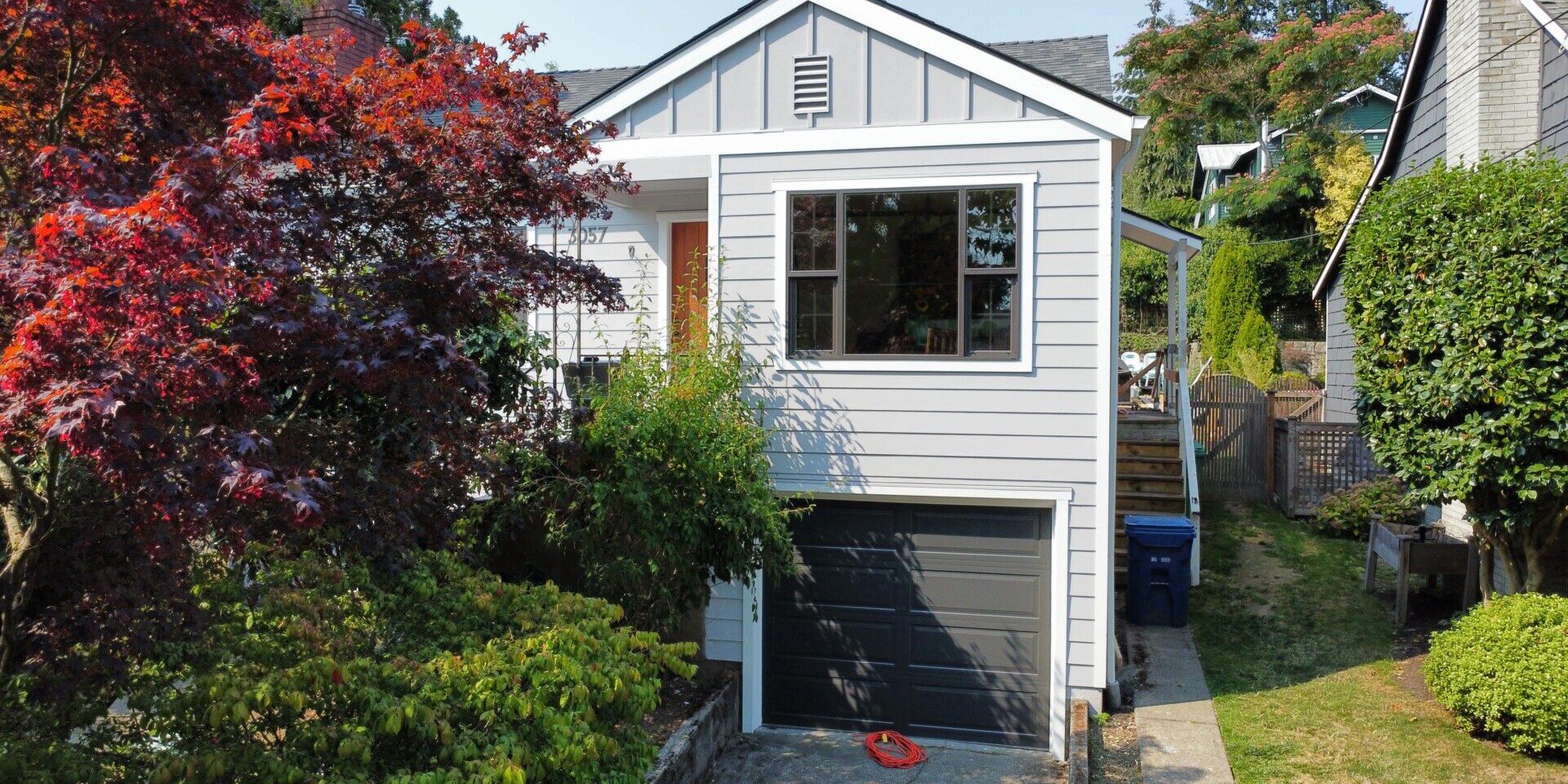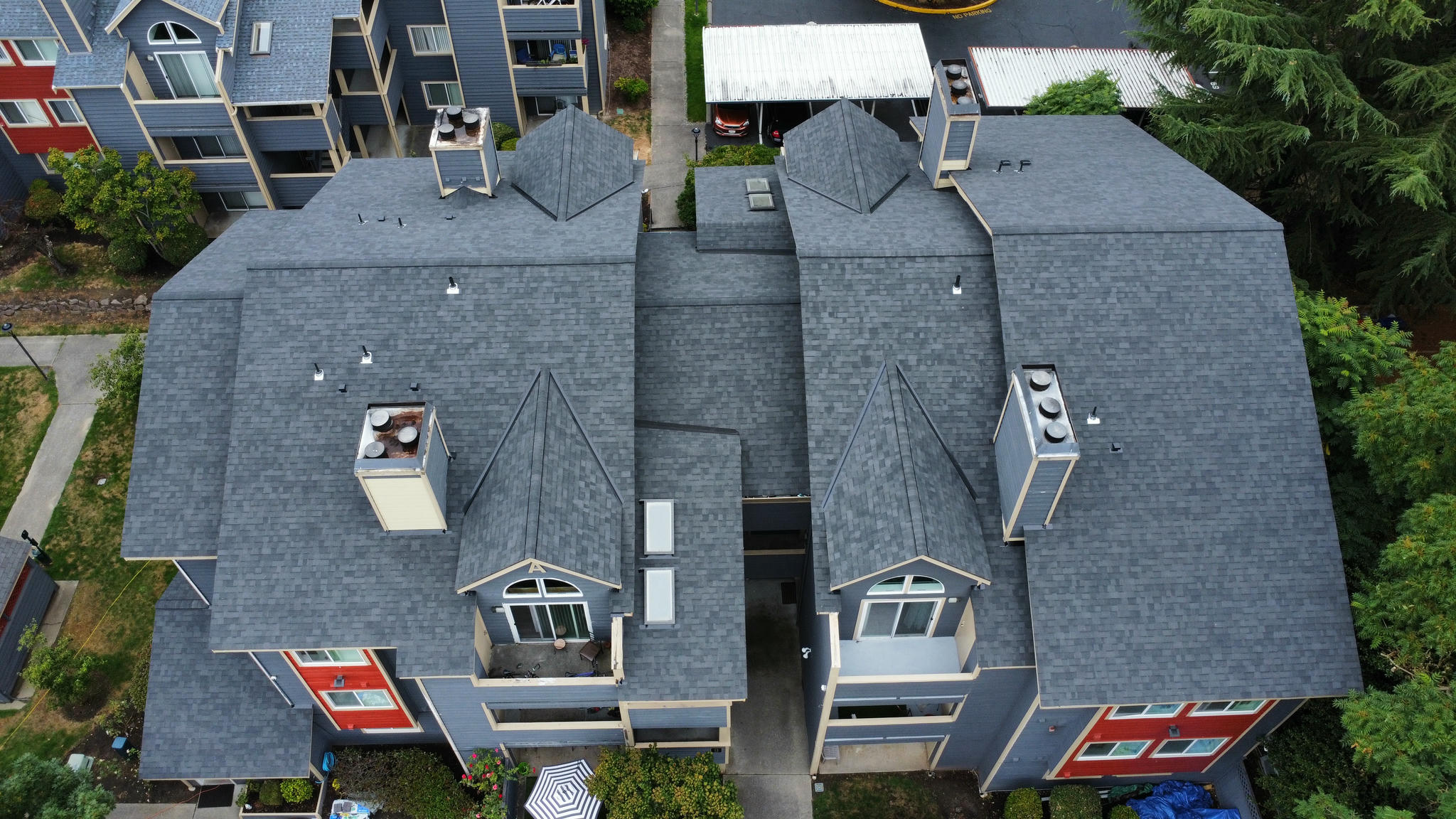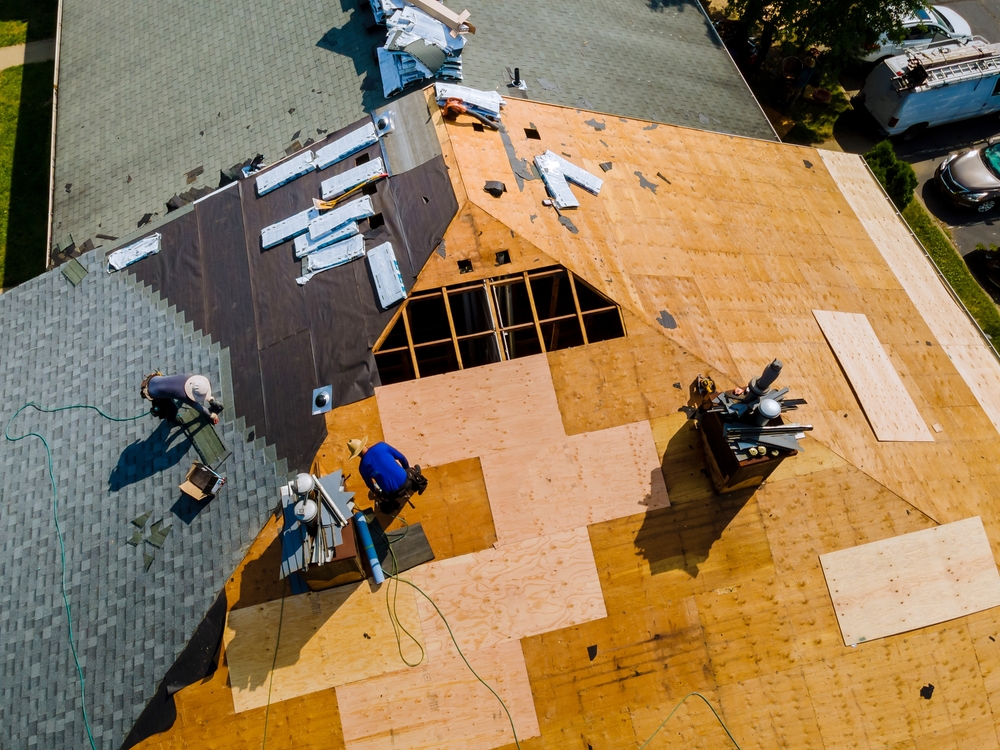Benefits of Asphalt Shingle Roofing: Affordability, Durability, and Versatility
Benefits of Asphalt Shingle Roofing: Affordability, Durability, and Versatility
By K Single Corp Roofing & General Contractor
When it comes to roofing materials, homeowners have more choices than ever. Metal, tile, wood shakes, and even rubber are among the many options available. However, for decades, asphalt shingle roofing has remained the most popular and widely used roofing material in North America, and for good reason.
If a worn-out roof needs replacing or a new home is on the horizon, asphalt shingles might be a good choice. In this blog post, we’ll examine the primary benefits of asphalt shingle roofing and explain why it could be the best fit for your project.
Affordability
Few roofing materials can match the budget-friendly nature of asphalt shingles, making them an excellent choice for both cost-conscious homeowners and those looking for overall value.
Upfront Affordability
When it comes to roof replacement or new construction, affordability is often a top consideration for homeowners. Compared to others, asphalt shingles consistently stand out as one of the most cost-effective options on the market. They generally have lower production and installation costs compared to other roofing materials, such as slate, metal, or tile.
Because of their widespread availability, asphalt shingles can also save on transportation costs, further lowering the overall price for homeowners. For budget-conscious property owners, asphalt shingles offer an excellent balance between low upfront cost and high value in the long run.
Low Maintenance and Repair Costs
One of the hidden savings that come with asphalt shingle roofing is the relative ease and affordability of maintenance and repairs. Minor issues like cracked or missing shingles are typically straightforward fixes and can be done on a per-shingle basis.
This can save homeowners significant amounts of money over time, as you often don’t need to replace large sections of the roof to address small problems. In addition, routine inspections and simple cleaning can keep your asphalt shingle roof in top shape for many years without major expense.
Long-Term Investment
While cost-effectiveness might bring to mind short-term savings, asphalt shingles can also be a smart long-term investment, provided they are properly installed and maintained. Many asphalt shingle products are designed with warranties that can range from 20 to 50 years, depending on the manufacturer and specific line of shingles chosen.
When you calculate the combination of affordability, ease of maintenance, and respectable lifespan, the return on investment for asphalt shingle roofing can be impressive.
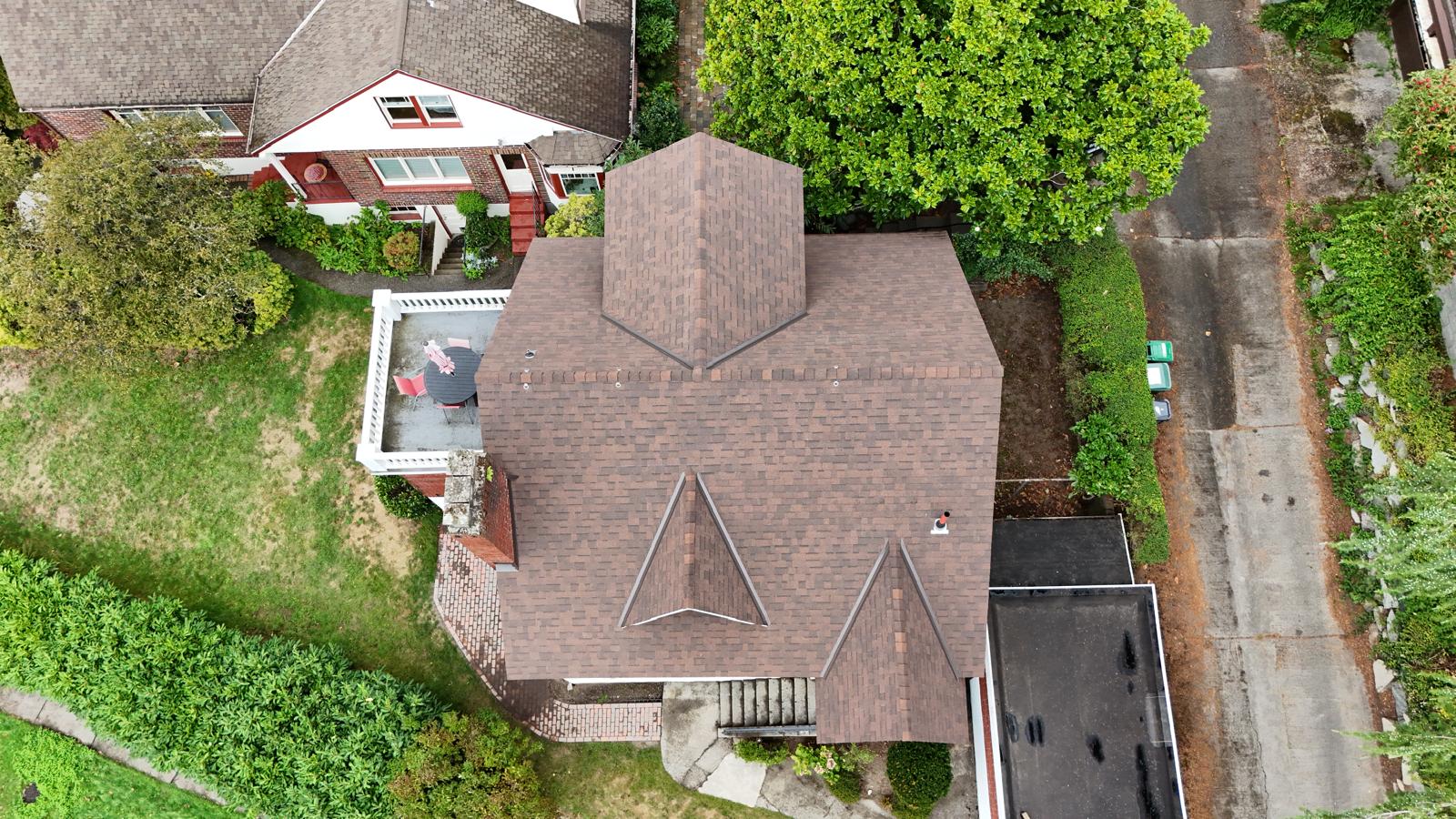
Durability
While cost is essential, a roof’s ability to withstand weather extremes and protect your home year-round is equally crucial. That’s where asphalt shingles shine.
Resistance to Weather Extremes
Durability is another key reason why asphalt shingles have remained so popular. The best asphalt shingle products are engineered to withstand a wide range of weather conditions, from scorching sun to heavy rain and high winds. This resilience makes them particularly suitable for areas that experience harsh or unpredictable weather patterns.
In addition, specialized shingles, often called architectural or laminated shingles, offer enhanced durability. These shingles feature extra layers or improved composition that provide even greater protection against wind and impact damage.
Preventing Leaks and Water Damage
A sturdy roof protects your home from more than just outside elements; it guards against interior structural damage, too. Asphalt shingles are designed to create a protective barrier that channels water off the roof, into the gutters, and away from your home’s foundation.
When installed correctly with quality underlayment and flashing, they do an excellent job of minimizing the risk of leaks, mold growth, and costly structural issues. Water damage can be one of the most expensive and frustrating home repairs, so a reliable roof is crucial for any homeowner.
Modern Manufacturing for Extended Lifespans
Thanks to significant advances in modern manufacturing, today’s asphalt shingles are far more durable than those of decades past. Many are constructed with fiberglass reinforcing mats, making them lighter yet stronger.
Granule technology has also improved, which helps protect the shingles from UV damage, which is a major factor in shingle deterioration over time. All of these enhancements combine to give homeowners a robust roofing material that can last for decades with minimal trouble.
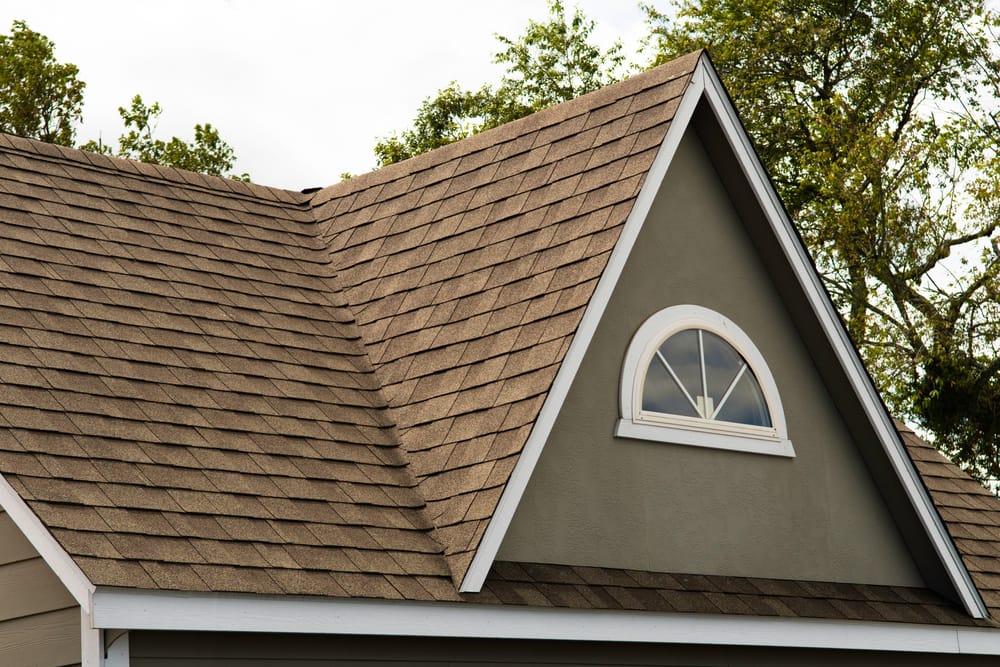
Versatility
Aside from cost and endurance, the flexible style options offered by asphalt shingles make them a universally appealing choice for a wide range of home designs.
A Wide Array of Styles and Colors
The versatility of asphalt shingles is a standout benefit. Asphalt shingles come in countless colors, textures, and styles, allowing homeowners to find an option that perfectly complements their home’s architecture and aesthetic.
Whether you want a classic, understated look or you’re trying to mimic the appearance of expensive materials like slate or wood shakes, there’s likely an asphalt shingle line to suit your style. This level of customization makes it easy for homeowners to blend their roofing choice with the broader design of their property and neighborhood.
Compatibility with Different Roof Designs
Not every house has the same roof pitch or design. Some homes have steeply sloped roofs, while others may be nearly flat or feature complex dormers, valleys, and peaks. The good news is that asphalt shingles work well with a range of roof designs.
Proper installation techniques can accommodate different pitches and shapes, ensuring your roof remains structurally sound regardless of design complexities. That flexibility is part of why asphalt shingles remain such a universal choice.
Easy Upgrades and Renovations
Since asphalt shingles are so common, finding new matching or complementary shingles for an addition or renovation project is generally straightforward. If you decide to expand your home, matching the existing shingles is often simpler and more cost-effective than with less common roofing materials.
This not only saves money but also helps you maintain a consistent design and appearance across the entire roof, which can be important for aesthetics and resale value.
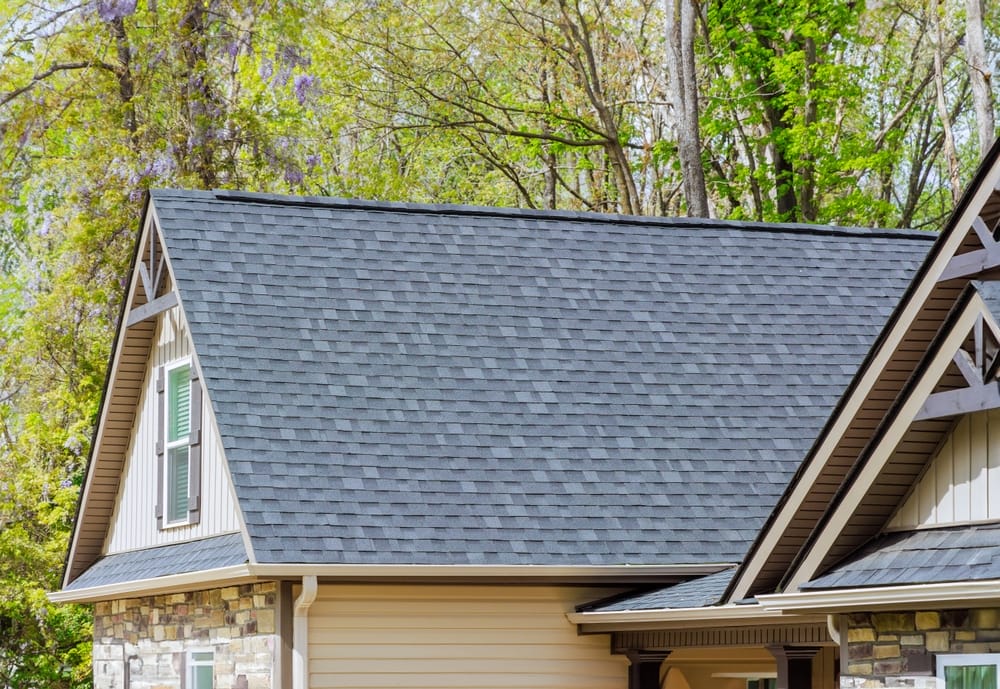
Choosing the Right Roofing Contractor
Even with the best materials, proper installation is critical for ensuring your roof’s longevity. Choosing a reputable roofing contractor with extensive experience in asphalt shingle installation can make all the difference.
Look for contractors who use quality materials, have a track record of satisfied customers, and understand local building codes and climate considerations. A trustworthy contractor will also offer warranties on both materials and labor.
Why K Single Corp Roofing & General Contractor?
If you’re in need of asphalt shingle roofing services, K Single Corp is a reliable choice. We understand the specific demands and challenges that come with roofing in our area, and our experienced team is prepared to handle projects of all sizes and complexities.
From helping you select the perfect asphalt shingles to ensuring a clean and timely installation, we provide comprehensive support every step of the way.
Looking To Install Asphalt Roofing? Schedule Your FREE Estimate With K Single Corp Today
If your roof can no longer perform at its optimal level and you’re ready to invest in a new one, call K Single Corp Roofing & General Contractor today. In a FREE estimate, we can inform you of whether a replacement is a good idea and answer any questions you may have. We look forward to hearing from you!
Types of Shingle Roofing Materials: Comparing Asphalt, Wood, and Composite Shingles
Types of Shingle Roofing Materials: Comparing Asphalt, Wood, and Composite Shingles
By K Single Corp Roofing & General Contractor
When it comes to protecting your home, few elements are as important as the roof over your head. Shingles are one of the most popular roofing materials because they’re affordable, versatile, and stylish. But the term “shingle” doesn’t refer to just one type of roofing material—there are several options available, each with its unique qualities.
This guide will walk you through the three main types of shingle roofing materials—asphalt, wood, and composite—so you can make an informed decision for your home. We’ll explore their makeup, the pros and cons of each type, and how they compare in terms of durability, cost, lifespan, weather resistance, maintenance, and overall appearance. Keep reading about all things shingle roofing.

Asphalt Shingles
What Are They?
Asphalt shingles are the most common type of roofing material in the United States. They are made from a base (usually fiberglass or organic felt) coated with asphalt, then topped with mineral granules for additional weather resistance and aesthetic appeal.
Types of Asphalt Shingles
- 3-Tab Shingles: Lightweight, flat, and uniform in design, these are the most budget-friendly asphalt shingles.
- Architectural Shingles: A thicker and more dimensional option that offers a modern look and improved durability.
- Luxury Shingles: High-end shingles designed to mimic natural materials like slate or cedar, offering premium style and performance.
Pros and Cons of Asphalt Shingles
Pros:
- Affordable: Asphalt shingles are the most cost-effective roofing material, ideal for budget-conscious homeowners.
- Variety: Asphalt shingles are available in a wide range of colors and styles to suit different home designs.
- Easy Installation: Quick to install, which can help reduce labor costs.
- Lightweight: Does not require additional structural support.
- Recyclable: Asphalt shingles can be recycled, reducing their environmental impact.
Cons:
- Durability: While durable enough for most climates, they may wear out faster in harsh weather conditions (like extreme heat or hail).
- Vulnerable to Wind Damage: Generally speaking, asphalt shingles are more susceptible to blowing off in strong storms or high winds.
- Susceptible to Cracking: Extreme cold or hot temperatures can cause asphalt shingles to become brittle, cracked, or warped.
- Aesthetic Wear: Over time, the color of asphalt shingles can fade due to sun exposure, making the roof appear worn and less attractive.
- Shorter Lifespan: Typically lasts 20–30 years, which is shorter compared to other roofing materials like metal.
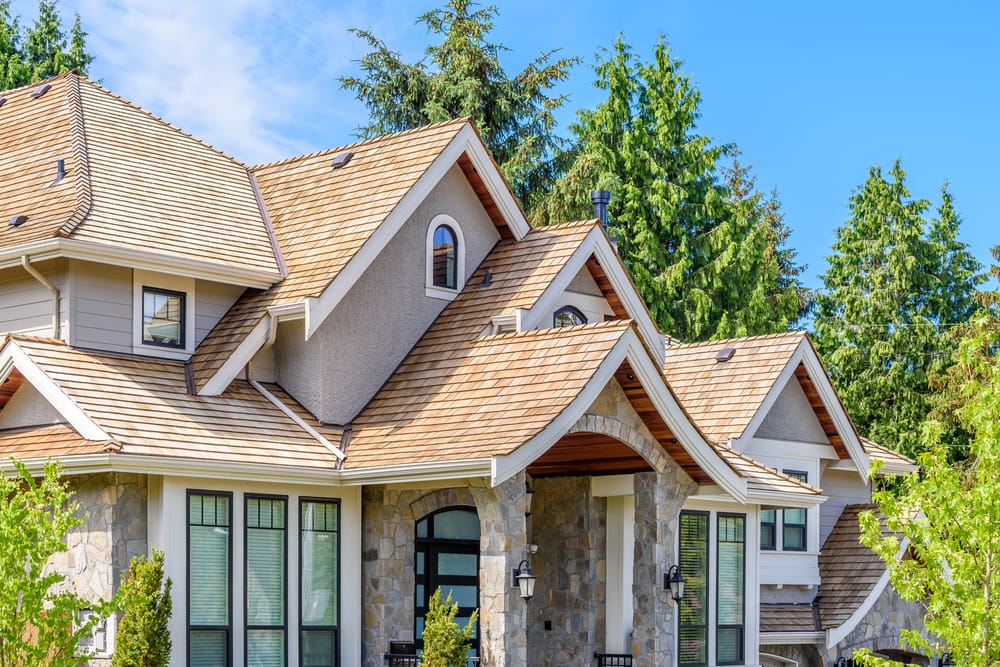
Wood Shingles
What Are They?
Wood shingles are made from natural materials like cedar, redwood, or pine. Known for their timeless and rustic appearance, wood shingles are often chosen for homes aiming for a more traditional or eco-friendly look. They can be machine-cut (for uniformity) or hand-split (for a more rugged aesthetic).
Types of Wood Shingles
- Cedar Shingles: Cedar is the most popular material due to its natural oils, which provide resistance to pests and decay.
- Redwood Shingles: Similar to cedar but with a reddish tint, they offer an equally durable and classic appearance.
Pros and Cons of Wood Shingles
Pros:
- Aesthetics: Wood shingles provide a warm, elegant and natural look that stands out from synthetic materials.
- Timeless Appeal: Wood shingles tend to age gracefully, developing a distinctive patina over time that many homeowners find appealing.
- Durability: When properly maintained, wood shingles can last 30 to 50 years or longer, depending on the wood type and climate.
- Eco-Friendly: Many wood shingles are made from sustainable sources and can be recycled at the end of their lifespan.
Insulation: Offers better thermal insulation compared to asphalt or composite shingles.
Cons:
- Cost: Typically more expensive than asphalt shingles.
- High Maintenance: Requires regular treatment to prevent moss, moisture damage, and pest infestations.
- Vulnerability to Weather: Wood shingles can be more susceptible to weathering, cracking, and splitting over time, especially in regions with extreme temperatures or high humidity.
- Potential for Mold and Mildew: If not properly treated or maintained, wood shingles can develop mold or mildew in damp conditions
- Flammability: Untreated wood shingles are more susceptible to fire, though fire-resistant options are available.
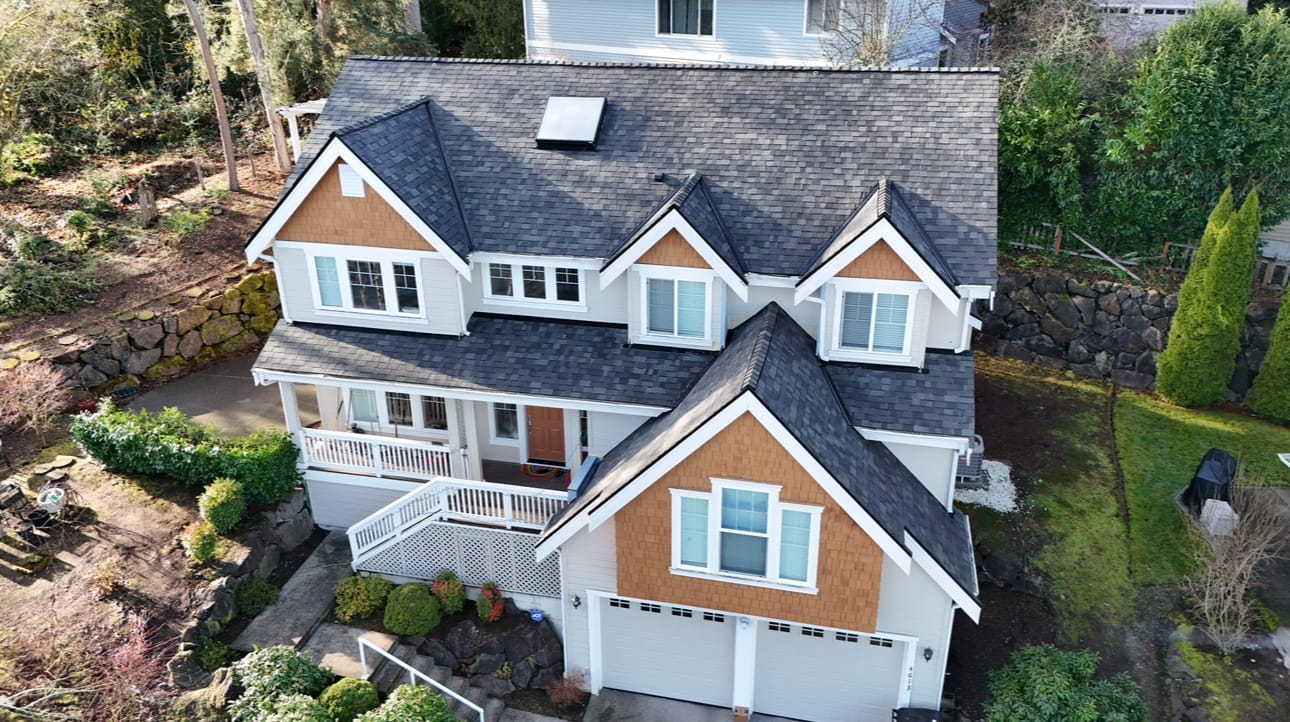
Composite Shingles
What Are They?
Composite shingles are made from a combination of materials such as recycled plastics, polymers, and fiberglass. They are designed to mimic the look of natural materials (like wood or slate) while providing added durability and lower maintenance.
Types of Composite Shingles
- Synthetic Slate Shingles: Designed to replicate the elegance of natural slate without the weight or cost.
- Synthetic Cedar Shingles: Offers the warm look of cedar wood with improved resistance to fire and decay.
Pros and Cons of Composite Shingles
Pros:
- Durability: Highly resistant to cracking, warping, mold, and mildew.
- Lightweight: Can mimic natural materials like slate without requiring structural reinforcement.
- Low Maintenance: Does not require the upkeep associated with natural materials.
- Eco-Friendly: Often made from recycled materials, contributing to a sustainable choice.
Cons:
- Cost: Generally more expensive than asphalt shingles but less costly than natural slate or wood.
- Aesthetic Limitations: While composite shingles can mimic the look of other materials (like wood or slate), they may not always match the authenticity and appeal of the real thing,
- Limited Availability: May not be as widely available as asphalt or wood shingles, depending on the region.
Comparing Asphalt, Wood, and Composite Shingles
Material Makeup & Durability
- Asphalt: Fiberglass or organic base with an asphalt coating. Durable for most weather conditions but less so in extreme environments.
- Wood: Natural materials with inherent charm but prone to moisture and pest damage without proper maintenance.
- Composite: Synthetic materials designed for maximum durability with high resistance to cracking and mold.
Cost
- Asphalt: Most budget-friendly option, ideal for homeowners seeking affordability.
- Wood: Mid-to-high price range, depending on seasoning and fire treatment.
- Composite: Higher upfront cost but offers long-term value due to durability and low maintenance.
Lifespan
- Asphalt: 20–30 years.
- Wood: 25–35 years when well-maintained.
- Composite: Often the longest lifespan, ranging from 30–50 years.
Weather Resistance
- Asphalt: Handles most climates but may degrade more quickly in extreme conditions.
- Wood: Naturally insulating but susceptible to moisture unless treated.
- Composite: Excellent weather resistance across the board, including UV and hail.
Maintenance
- Asphalt: Minimal maintenance required; periodic inspection suggested.
- Wood: Requires regular cleaning, sealing, and treatments.
- Composite: Extremely low maintenance, retaining its appearance and performance for decades.
Appearance
- Asphalt: Wide variety of colors and styles but less authentic in texture.
- Wood: Naturally beautiful with a warm, rustic appearance.
- Composite: Mimics high-end materials like slate and cedar with convincing detail and texture.
Making the Right Choice for Your Roof
Choosing the right shingle roofing material depends on your budget, aesthetic preferences, and long-term priorities. Here are some recommendations:
- If you’re looking for affordability and easy installation, asphalt shingles are a fantastic choice.
- If you value a rustic, natural look and are willing to invest in maintenance, wood shingles stand out.
- If you want durability, minimal upkeep, and high-end aesthetics, composite shingles offer the best of all worlds.
Schedule Your FREE Estimate With K Single Corp Today
Here at K Single Corp, we understand that your roof is an investment. Our experts are here to help you choose the perfect shingle for your home and budget. Contact us today for a free consultation and a tailored roofing solution!
Metal Roofing vs. Asphalt Shingles: Which Is the Better Long-Term Investment?
Metal Roofing vs. Asphalt Shingles: Which Is the Better Long-Term Investment?
By K Single Corp Roofing & General Contractor
If you’re considering replacing your roof or building a new home, you’re likely wrestling with the big question, “Metal roofing or asphalt shingles?” Both are incredibly popular options, but which offers better value in the long run? While metal is the better long-term investment, it really depends on your unique needs as a homeowner.
To help you make an informed choice, we’ll compare metal roofing and asphalt shingles across key factors like cost, durability, energy efficiency, and more. By the end of this post, you’ll have a clearer sense of which roofing material works best for your budget, durability needs, and maintenance preferences.
Let’s dive in.

What is Asphalt Shingle Roofing?
Asphalt shingles are the most widely used roofing material in the United States due to their affordability and ease of installation. They consist of a base, typically made from fiberglass or organic felt, which is coated with asphalt and finished with mineral granules. These granules not only provide added protection against the elements but also contribute to the shingles’ aesthetic appeal by offering a variety of colors and textures.
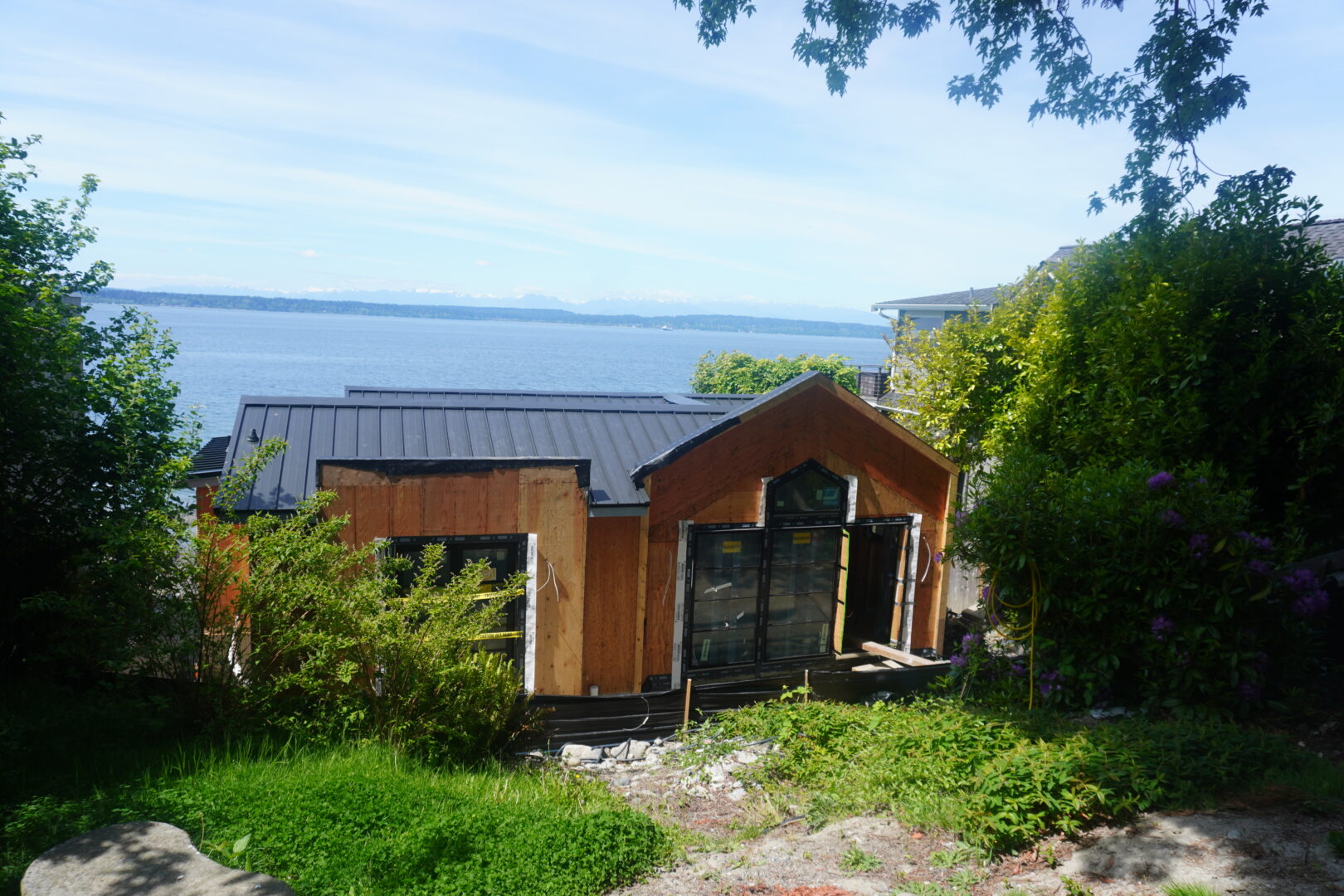
What is Metal Roofing?
Metal roofing is made from materials like steel, aluminum, copper, or zinc. These roofs are designed to provide excellent protection against the elements, offering superior resistance to harsh weather, including wind, rain, and snow. There are several styles available, including standing seam, metal shingles, and corrugated panels, each offering different aesthetic and functional benefits. Additionally, metal roofs are often coated with protective finishes to guard against rust and corrosion.
Which is Better: Asphalt Shingles or Metal Roofing?
The answer depends on your priorities as a homeowner. To help you decide, here’s a comparison across key factors:
| Asphalt Shingles | Metal Roofing | |
| Cost | Low initial cost ($100-$200 per sq.) | Higher initial cost ($300-$700 per sq.) |
| Installation | Easy to install; affordable labor | Requires specialized skills; higher labor costs |
| ROI | Asphalt shingles offer a decent return on investment for short-term homeowners who may not stay in the home for decades. Due to their affordable upfront cost, you’ll get a good amount of value for the money during your time in the home. | Metal roofing provides a higher ROI for long-term homeowners. The material’s extended lifespan (often 40-70 years or more) means that, over time, the investment pays off. |
| Durability | Asphalt shingles are moderately durable, but they can be prone to damage from extreme weather, such as high winds, hail, or heavy rain | Metal roofing offers exceptional durability and is highly resistant to most weather conditions, including high winds, hail, rain, fire, and extreme temperatures. |
| Lifespan | 15–30 years | 40–70+ years |
| Energy Efficiency | Asphalt shingles offer some insulation benefits but can absorb heat from the sun, which may increase cooling costs in warmer climates. | Metal roofs are known for their high energy efficiency, as they reflect sunlight rather than absorbing it. This reflection helps keep your home cooler, reducing the need for air conditioning in the summer. |
| Maintenance | Requires regular inspections/repairs. Asphalt shingles require regular inspections and maintenance. Over time, shingles may crack, lift, or become warped by wind, hail, or heat, requiring repair or replacement. | Metal roofs are virtually maintenance-free. Due to their durability and resistance to most weather conditions, metal roofing requires very little attention beyond occasional cleaning |
| Weather Resistance | While asphalt shingles provide some weather protection, they are still extremely susceptible to damage from weather conditions. This is important to keep in mind. | Metal roofing has excellent weather resistance and is capable of handling extreme conditions such as hail, heavy snow, strong winds, and even wildfires. |
| Environmentally Friendly | Non-recyclable; ends up in landfills | Fully recyclable; often made from eco-friendly materials |
| Appearance | Asphalt shingles come in a wide variety of styles, colors, and textures, allowing homeowners to match the roof with their home’s aesthetic. Asphalt shingles come in a wide variety of styles, colors, and textures, allowing homeowners to match the roof with their home’s aesthetic. | Metal roofs offer a modern and sleek aesthetic. |
A Comparative Look Between These Two Options
Now that you’ve seen the run-down comparison between metal and asphalt roofing based on the key factors, let’s talk about what that means for you as a homeowner.
1. Cost
If your budget is tight, asphalt shingles may feel like the better option due to their low upfront cost. However, over time, the frequent repairs and earlier replacement costs can diminish the savings. Metal roofs require a higher upfront investment, but their longevity and minimal maintenance can be more cost-effective in the long run.
2. Durability and Weather Resistance
When it comes to standing up to nature’s extremes, metal roofing takes the crown. It outperforms asphalt shingles in areas prone to strong winds, heavy rain, or hail. If durability and weather resistance are your main concerns, metal roofing is well worth the investment.
3. Lifespan
Metal roofing’s lifespan is one of its strongest selling points. While you may replace an asphalt shingle roof two or three times, a metal roof could last for the duration of your homeownership or even beyond.
4. Energy Efficiency
Metal roofing reflects heat, making it an excellent choice for keeping your home cool in the summer. Asphalt shingles, on the other hand, absorb heat—potentially increasing your energy bills. If energy efficiency is a priority, metal roofing is the way to go.
5. Maintenance
While asphalt shingles require regular inspections and occasional repairs, metal roofs are virtually maintenance-free. This makes metal roofs a go-to option for homeowners interested in hassle-free materials.
6. Sustainability and Environmental Impact
Metal roofing is the sustainable choice as it’s often made from recycled materials and is 100% recyclable. Asphalt shingles, on the other hand, contribute to increasing waste as they aren’t recyclable in most cases.
7. Appearance
Both asphalt shingles and metal roofing offer a range of styles and finishes to enhance your home’s curb appeal. Asphalt shingles can mimic traditional styles, while metal roofs can provide a sleeker, modern look.
What’s the Right Roofing Choice for You?
Ultimately, it comes down to your priorities and budget as a homeowner. What is most important to you? That you never have to worry about maintenance? Is the aesthetic appeal of your home important, and does the roof match that style? Do you need a roof that can withstand heavy snow, hail, or other extreme weather conditions in your area?
Also, think about your long-term plans. Are you in your forever home, or do you plan to move in a few years? How much time do you have for regular roof maintenance? What type of weather is common in your region? Asking these questions should help you land between the two options.
In Summary:
- Opt for asphalt shingles if you’re looking for an affordable, easy-to-install roofing option that offers a variety of styles and colors to match your home.
- Choose metal roofing if you value long-term investment, minimal maintenance, and a roof that can withstand harsh weather conditions
Let K Single Corp Guide You Toward The Best Roofing System!
Whether you’re steering towards the classic charm of asphalt shingles or the modern resilience of metal roofs, K Single Corp is here to help. Our roofing experts can guide you through the process and ensure you find the perfect roof for your home. Contact us today for a free consultation and personalized quote.
Understanding Warranties: What to Look for in Your Roofing Warranty
Understanding Warranties: What to Look for in Your Roofing Warranty
By K Single Corp Roofing & General Contractor
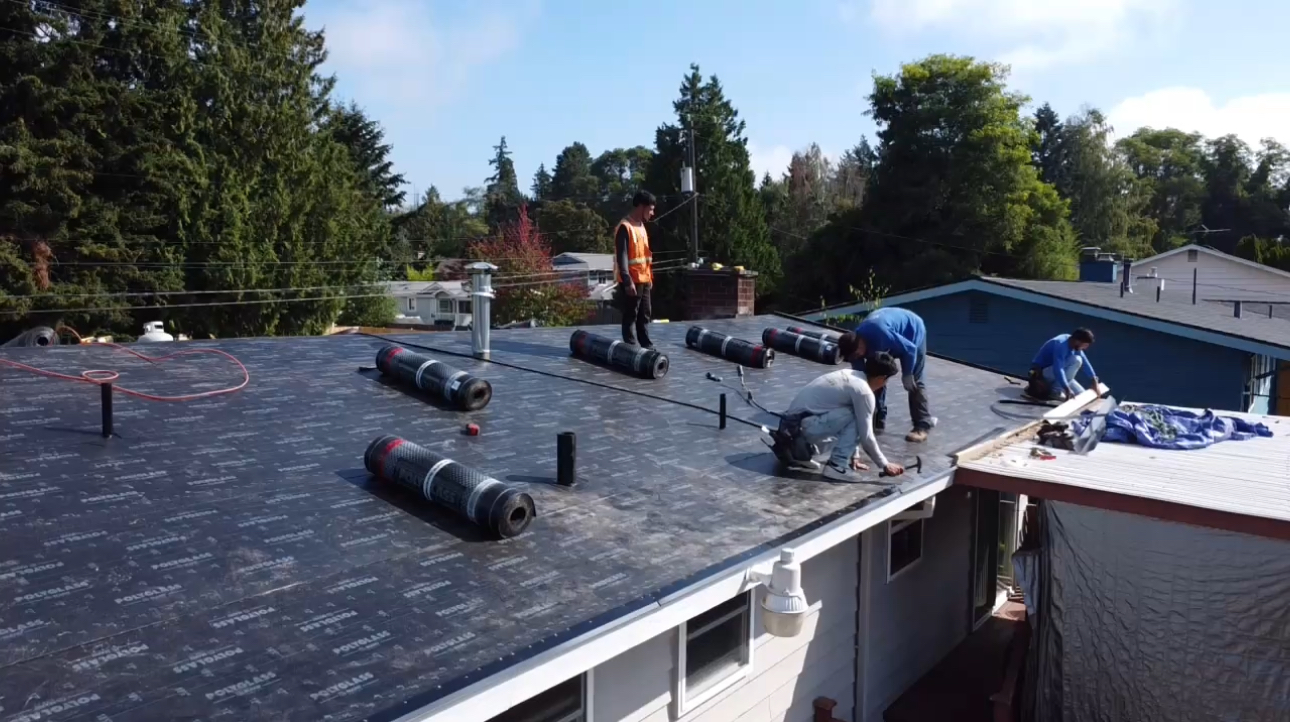
There’s no denying that a roof replacement or installation is an important yet costly undertaking. The good news is reputable roofing contractors offer roofing warranties to protect your investment and give you some much-needed peace of mind. Since warranties may be confusing at first glance, here’s a closer look at what they are and what to look for when you’re exploring various options.
Why Are Roofing Warranties Important?
Even if you choose a highly skilled and experienced contractor and/or top-of-the-line roofing material, something may go wrong with your roof. That’s where roofing warranties come in. When your roof replacement is backed by a warranty, you can mitigate roof risks and in turn, protect the exterior and interior of your home. Without a roofing warranty, you put your property (and loved ones) at risk, especially if you don’t have the thousands of dollars it might take to repair an issue. If you come across a contractor that doesn’t offer warranties, continue your search, as this is a huge red flag.
Three Types of Roof Warranties
1. Manufacturers’ Warranties
When you decide to move forward with a roof replacement or roof installation, it should be covered by the manufacturer’s warranty. In some cases, the contractor will provide you with the details, but sometimes, you’ll have to go to the manufacturer’s website for further information. Put simply, manufacturer warranties protect your roofing materials from defects and failures.
If you splurge on a higher-end roofing material, the manufacturer’s warranty may last longer. However, on average, manufacturer warranties fall in the 5 to 30-year range. Note that these contracts won’t apply if your roof isn’t installed or maintained properly. Also, they don’t usually cover damage from severe weather conditions.
2. Contractor and Installation Warranties
Typically offered by roofers or contractors directly, installation warranties focus on craftsmanship and tend to provide more protection than manufacturer warranties. The caveat, however, is that they can vary significantly and depend on who is providing it.
For this reason, you should clarify the specifics of the contractor with your roofer or contractor. Ideally, they’d outline the coverage in your quote, contract, or agreement. If you notice a roofing issue that was the result of an installation flaw, you should be able to resolve it through your installation warranty.
Keep in mind that it’s not uncommon for roofers to offer limited guarantees on their workmanship, meaning if you hire another contractor to maintain or repair your roof, the warranty will no longer be valid. Installation warranties usually last for five to 10 years. Some contractors go the extra mile and guarantee their work for 25 or even 30 or 40 years, especially if you opted for a higher-end roof.
3. Extended Manufacturer Warranties
Extended manufacturer warranties are created for homeowners who are longing for additional peace of mind. Compared to standard manufacturer warranties, these contracts offer more robust coverage and cost more. Depending on the extended warranty you choose, you may enjoy coverage for both roofing materials and installation for 50 years.
If you’re interested in an extended warranty, be sure to ask your roofer or contractor if it’s an option. In many cases, these contracts are only offered by certified contractors who have met certain requirements imposed by the manufacturer. Also, while extended warranties are comprehensive, they don’t cover everything. For example, if your roof sustains damage from a severe hailstorm, your extended warranty won’t necessarily apply. The exception is if you specifically ask the manufacturer to include it in your coverage.

How to Protect Your Roof Warranties
Fortunately, there are several strategies that can help you choose the right roofing warranties and take full advantage of them. These include:
- Read the Fine Print: Roof warranties can be confusing. That’s why it’s your responsibility to read your warranty contract thoroughly. If something doesn’t make sense, reach out to your contractor or the manufacturer for clarity. Also, make sure you understand coverage exclusions and limitations. Otherwise, you may be on the hook for surprise expenses you didn’t anticipate.
- Register the Warranties: Typically, you’ll need to register a manufacturer’s warranty within a certain time period to activate it. If you disregard this step, you may not have coverage when you need it. Most manufacturers let you register your warranty online or via phone.
- Continue to Work with the Same Roofer: If you hire another contractor to maintain or repair your roof, you may void your installation warranty, as contractors don’t want to guarantee the work of others. Once you find a reputable roofer you like, commit to their services for all your roofing needs.
- Don’t Forgo Inspections: Most warranties require regular roof inspections, usually every two years or so. This way, professionals can spot issues early on before they become more expensive and complicated to fix. If your warranty has this stipulation, make sure to follow through with it.
In Need of an Experienced Seattle Roofer? Schedule Your FREE Estimate With K Single Corp Today
K Single Corp is so confident in the quality of our work that we offer a generous 10-year labor and material warranty, providing you with a great deal of peace of mind if you choose us for your roof investment. For more information, we encourage you to schedule a FREE estimate today. We’re a premier roofing company in Seattle, and we can’t wait to hear from you.
How to Assess Roofing Lifespan: Factors That Affect Durability
How to Assess Roofing Lifespan: Factors That Affect Durability
By K Single Corp Roofing & General Contractor
While you may not think about it often, your roof is one of the most important components of your home. After all, it protects it from the elements and keeps your interior dry, creating a safe, comfortable environment for your family and guests. Your roof also plays a pivotal role in insulating your home to keep it warm in the winter and cool in the summer months. So, how long will your roof last? It depends on a number of factors, all of which we’ll explore below.
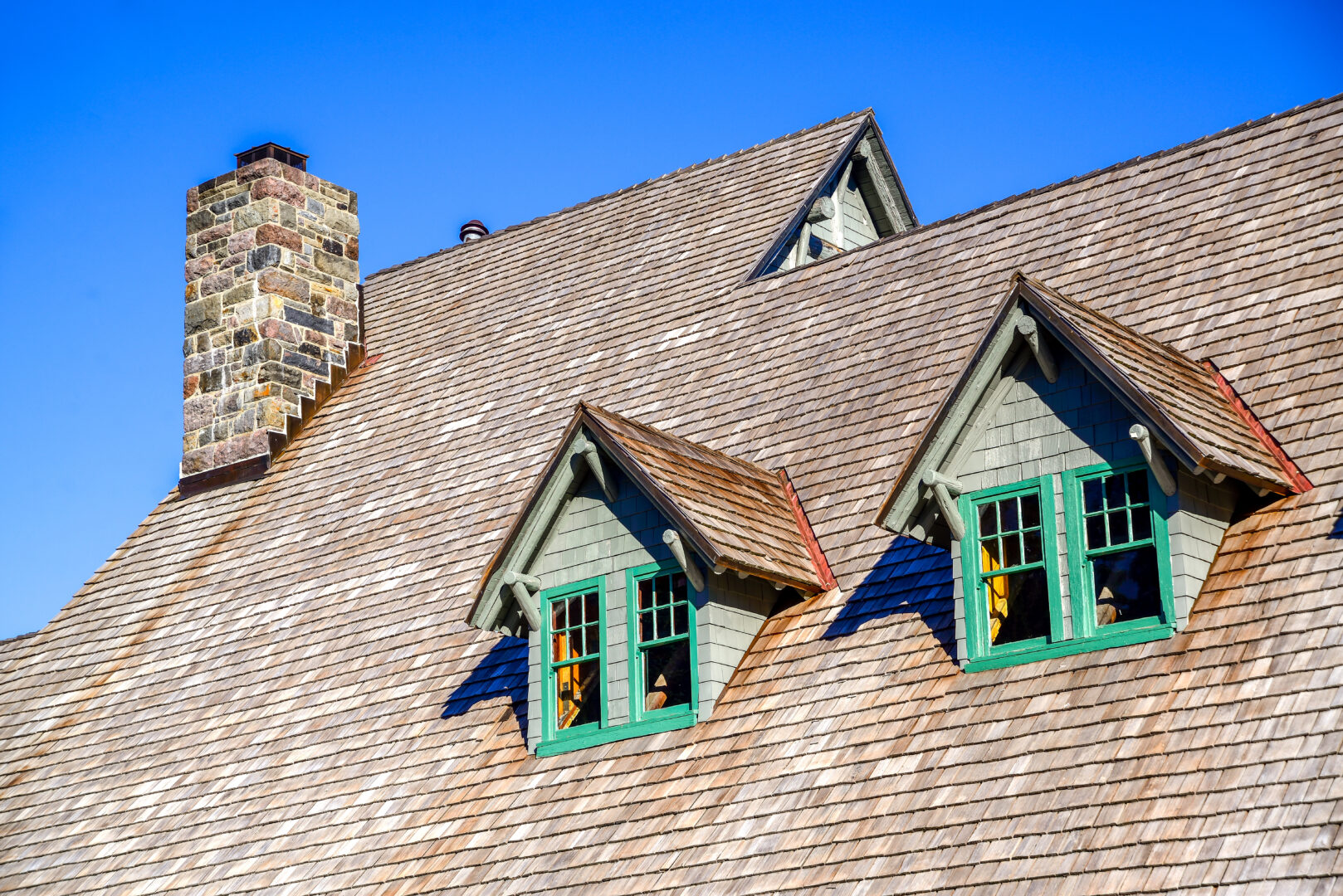
1. Roof Materials
When it comes to roofing materials, there is no shortage of options. Asphalt shingles, which are the most popular and affordable, usually last 20 to 25 years. Tile, concrete, and slate roofs are less common and more expensive but tend to last the longest. You may be surprised to learn that with proper care and maintenance, these roofs continue to do their jobs well for 50 to 100 years.
Metal roofs, which have increased in popularity, also offer long lifespans of more than 50 years. Perhaps the least durable roofing material is wood as it usually only lasts for up to 20 years and isn’t feasible in some weather conditions. Before you commit to a new roof, ask your contractor for an estimate of its lifespan. You may also find this information in the manufacturer’s warranty.
2. Installation Quality
Who installs your roof can mean the difference between a long-lasting roof and a problematic roof that requires frequent repairs and a sooner replacement. When you decide you’re ready for a new roof, be sure to shop around and compare contractors. Opt for a reputable company with excellent references, many positive reviews, and high ratings on third-party review sites.
Choosing a less experienced or cheaper roofer who takes shortcuts during the installation process can actually cost you in the long run. A seasoned roofing contractor who uses the highest quality equipment and most advanced techniques is essential if you want to increase the lifespan of your investment.
3. Roof Pitch
The slope or pitch of your roof may also contribute to its longevity. If you have a flat roof or one with a small slope, you may notice deterioration sooner as a result of slow water movement. Since you can’t necessarily change the structure of your home, a reputable roofer will recommend the most durable roof material for your unique property to help prevent your roof from this issue.
4. Your Location
The local climate and environmental conditions where you live also play a crucial role in determining your roof’s longevity. For example, in regions like Seattle with fluctuating temperatures and heavy rainfall, roofing materials may expand and contract, potentially leading to warping and cracks. Frequent storms can loosen roof membranes and deteriorate flashing over time.
Conversely, in areas with extreme sun exposure, UV rays can weaken roofing materials, causing premature aging and fading. Speak to your contractor about materials suited to your specific geographic region; different climates often call for specialized solutions.
5. Maintenance
Investing in a quality roof is just the first step—regular maintenance is essential if you want it to remain in peak condition for as long as possible. While some roofing materials require minimal upkeep, most need periodic inspections to detect and resolve issues early.
Schedule annual roof inspections with a professional, monitor for damaged shingles, and promptly clean gutters to avoid blockages. Regularly removing debris and trimming overhanging branches can help prevent damage caused by environmental factors. Ultimately, ongoing maintenance helps preserve the integrity of your roof and avoids costly repairs.
6. Ventilation
When your roof is ventilated properly, it will regulate the temperature in your attic and reduce the risk of issues, such as mold and wood rot. Adequate ventilation can also prevent your roof from overheating and premature aging. Consult with a skilled roofing contractor to ensure your roof’s ventilation is in a good spot.
7. Storm and Impact Resistance
Natural disasters like hailstorms, hurricanes, or falling debris can significantly shorten your roof’s lifespan if it is not built with impact-resistant materials. Many modern roofing products are rated for their ability to withstand such events, so it’s worth prioritizing impact-resistant options if you live in areas where extreme weather is common. Look for materials with high durability ratings or certifications for hail and wind resistance.
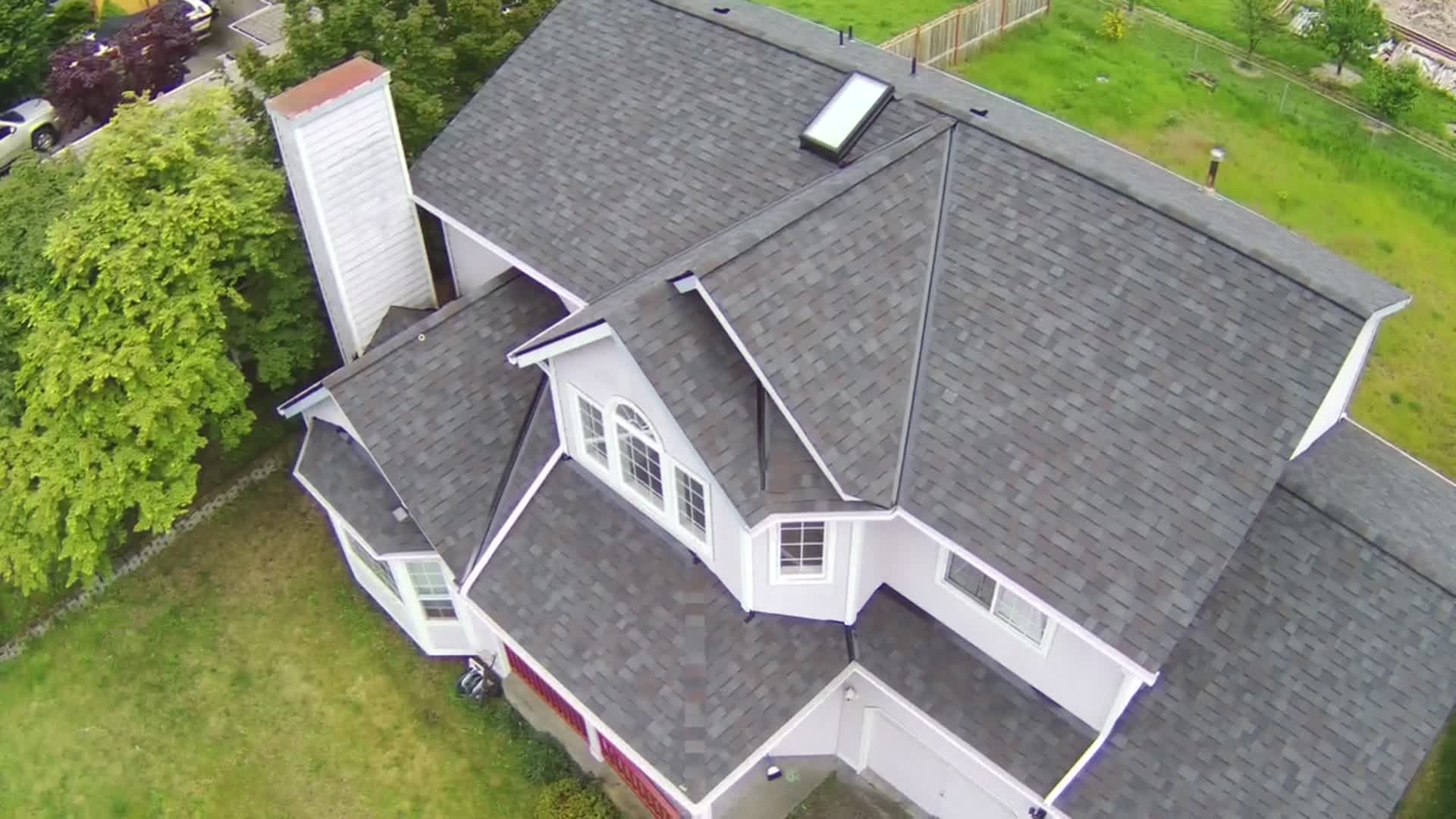
6 Ways to Extend Your Roof’s Lifespan
Here are some strategies that can allow you to increase the longevity of your roof and avoid a replacement for as long as possible.
- Clean Your Roof: Even though your roof may not be as visible as your windows or siding, it could benefit from an occasional cleaning. You can hire a roofer to clear your roof of debris and prevent the growth of algae and mildew. As an added bonus, a clean roof is going to boost your curb appeal.
- Fix Damaged Shingles: If you see damage or missing shingles, reach out to your roofing contractor for a resolution. Ignoring faulty shingles can lead to water leaks and mold while compromising the integrity of your roof. Note that while one or a few damaged shingles may be repaired, too many of them might warrant a replacement.
- Trim Surrounding Trees: Do you live in an area with lots of trees? If so, be mindful of where they are in relation to your roof. If they hang over your roof, it’s time to trim them. Even though you’ll likely need to invest in a tree trimming service, you may add years to your roof.
- Regular Roof Inspections: Schedule inspections with a professional roofer at least once or twice a year. These evaluations help catch small issues—like loose flashing or cracks—before they escalate into more expensive problems. They can also give you peace of mind knowing your roof is in good condition.
- Improve Attic Ventilation: A poorly ventilated attic can trap heat and moisture, which can damage your roof from the inside out. Ensure your attic is properly ventilated to regulate temperature and reduce humidity, extending the life of your roof and protecting its integrity.
- Install Gutter Guards: Clogged gutters can back up water onto your roof, leading to rot and leaks. Gutter guards prevent blockages by keeping debris out of your gutters. This helps rainwater flow freely, reducing the risk of water-related roof damage.
In Need of an Experienced Seattle Roofer? Schedule Your FREE Estimate With K Single Corp Today
At K Single Corp, our goal is to provide Seattle area homeowners with top-notch roofing services, increasing the longevity of one of the most crucial components of their home. Once you schedule a FREE estimate, we can come up with a game plan for how to increase the lifespan of your roof. We look forward to hearing from you!
Choosing Between Roof Repair and Replacement | What You Need to Know
Choosing Between Roof Repair and Replacement | What You Need to Know
By K Single Corp Roofing & General Contractor
In a perfect world, your roof would always be in perfect shape. However, at some point in time, you may notice issues with your roof that warrant either a roof repair or replacement. So, how do you know whether you could get away with a repair or require a full-blown replacement? It all depends on a number of factors, such as the problem at hand, the condition of your roof, your budget, and more. Keep reading to find out how to choose between a roof repair and a roof replacement.
Roof Repairs
A roof repair is exactly what it sounds like: It requires fixing parts of the roof, such as holes, missing shingles, ventilation, or flashing. With a roof repair, a contractor doesn’t have to remove and replace the roof from your home. Instead, they can work on a small portion of your roof and tackle an isolated issue. Compared to a roof replacement, a roof repair is a relatively minor undertaking that may increase your roof’s lifespan.
Therefore, roof repairs are usually quicker and more affordable ranging from $150 for small issues to $8,000 for more extensive ones. The main downside is that some repairs might prolong the need for more extensive repairs or complete replacements. Depending on the situation, it may leave underlying roofing problems in your roof. Also, if your issue is related to shingles, it can be a challenge to match new shingles to the color of your existing ones.
Roof Replacements
During a roof replacement, a contractor removes your existing roofing system and installs a new one. This is usually a multiple-day project that requires a great deal of specialized experience, cutting-edge equipment, and advanced techniques. As long as your roof gets installed by a professional roofer and you maintain it properly, it may last 20 to 25 years or even longer.
While a roof replacement can leave you with a brand-new roof that brings your home up to code and does wonders for your curb appeal, it doesn’t come cheap. To fully replace your roof, you may pay anywhere from $5,000 to $25,000 or even more. The cost will depend on several factors, such as the size of your roof, the materials you choose, and the contractor you hire.
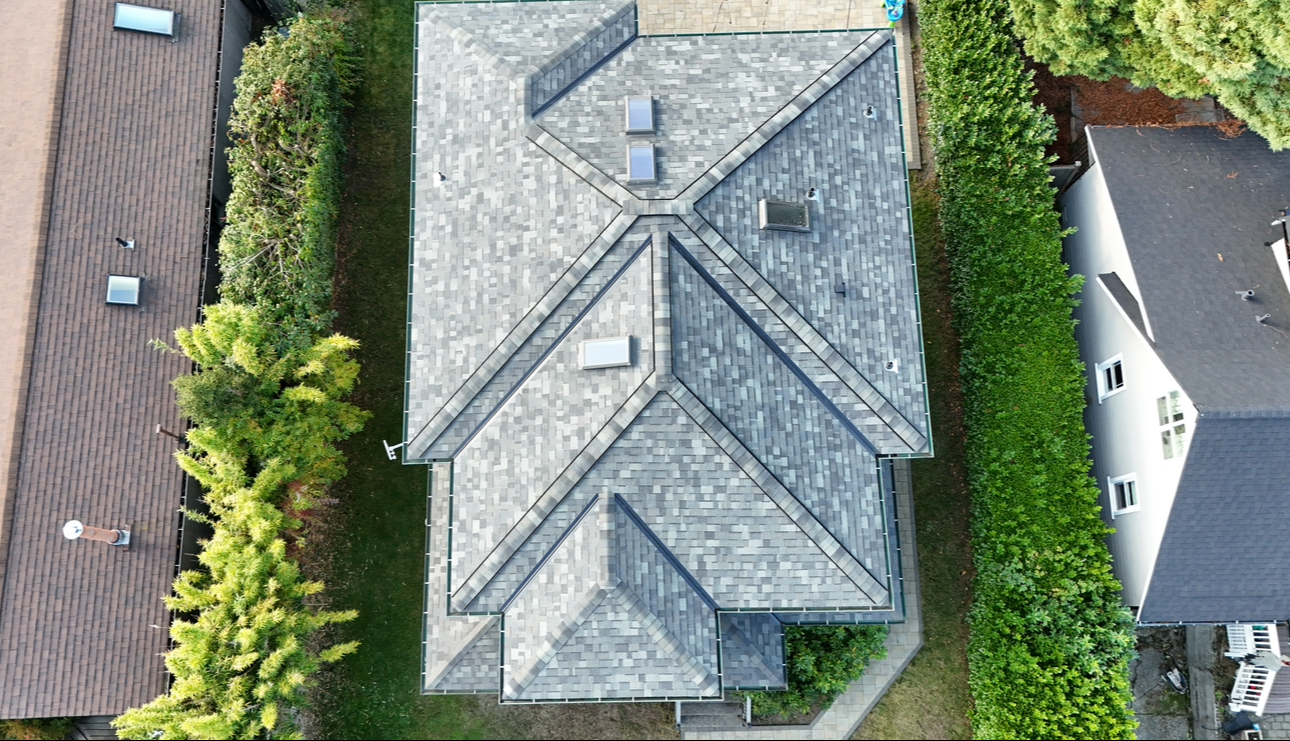
How to Decide Whether to Repair or Replace Your Roof
These factors can help you zero in on whether you’d be better off with a roof repair or roof replacement.
1. The Age of Your Roof
Most roofs have a relatively long lifespan of 20 years or even up to 50 years. If your roof is fairly new, a repair may be sufficient, especially if the issue is minor. However, if your roof is past its prime and you’re looking for a more permanent solution, a roof replacement may be worth the extra money. Fortunately, you’ll get a warranty that can protect it from material and installation-related damage.
2. The Extent of the Damage
If you’re missing a shingle and everything else looks good, you may simply repair your roof. However, a leaky roof might warrant a replacement as it can compromise the integrity of your home and increase the risk of mold and mildew growth. Other signs that might indicate your roof needs to be replaced include a sagging roof, an unexplained increase in energy bills, and recurring repairs that have already cost you a lot of money.
3. Your Long-Term Plans
Are you in your forever home or do you have plans to move in the near future? If you know you’ll move soon, a roof repair may work. However, keep in mind that if your roof has many issues that require multiple repairs, you might have trouble selling your home. A roof replacement is likely worthwhile if you plan on living in your home for a while and/or want to increase your home value and improve your curb appeal.
4. Your Budget
While a roof replacement may be a better option, finances might steer you toward repairing your roof instead. Note that if you do want to replace your roof, you may work with your contractor or third-party financing company to come up with a payment plan that aligns with your budget. Also, since your roof is one of the most important components in your home, saving up for a replacement may be better than dealing with constant issues and repairs. Additionally, you may be able to get away with a partial replacement and save on an entire replacement.
5. Warranty Coverage
Roofs typically come with warranties, such as manufacturer warranties, contractor or installation warranties, and/or extended warranties. Before you determine whether to repair or replace your roof, consider which warranties are in effect. If your roof is still covered by a warranty, the manufacturer or your roofer can help you decide which route to take.
Wondering Whether to Repair or Replace Your Roof? Schedule Your FREE Estimate With K Single Corp Today
If you’re unsure of whether you should repair or replace your roof, don’t hesitate to schedule a FREE estimate with K Single Corp today, the premier roofing company in Seattle and the surrounding areas. Our roofers can recommend a solution once they evaluate your roof’s condition and the extent of the damage. Allow our decades of expertise to help you make the most informed decision for your roof and property.
Tips for Hiring a Reliable Roofing Contractor
Tips for Hiring a Reliable Roofing Contractor
By K Single Corp Roofing & General Contractor

If you’re in search of a roofing contractor in the Seattle Metro area, there are plenty of options at your disposal. However, not all roofers are created equal. In fact, you’ll find that there are significant differences between many of them.
Since your roof is one of the most important and expensive parts of your home, who you choose to inspect, repair, or install it matters. Here are our top tips to help you zero in on a reliable roofing contractor that gets the job done right, on time and on budget.
1. Read Reviews
It’s all too easy for an individual or company to say they’re best. However, real reviews from current and former customers are far more telling. Before you commit to a roofer, be sure to do your research and check out reviews on third-party review sites, such as TrustPilot and the Better Business Bureau (BBB). While a few negative reviews are no big deal, many of them can be a red flag, especially if they revolve around the same issues. The way a roofer responds to reviews is important as well.
2. Ensure the Roofer is Licensed, Bonded, and Insured
A quality Seattle Area roofing contractor should be licensed, bonded, and insured in Washington. All three of these credentials prove that a roofer is serious about their job. They also indicate a sense of professionalism and financial stability. Plus you’ll be protected legally if an unforeseen incident occurs and things don’t go as planned. Don’t be afraid to ask a roofer for proof they’re licensed, bonded, and insured.
3. Only Consider Local Roofers
When you look for a contractor, you may find roofing companies or individual roofers who are located in a different state. To ensure the professional you choose is aware of the local codes, paperwork, and regulations in your area, confirm that they have a local phone number and physical office near you. A local roofer is also a good idea in the event you need to find them after a problem. Prioritizing local pros can also help you avoid companies who are simply trying to take advantage of you after a storm like the bomb cyclone that hit our area in November 2024.
4. Ask Your Network for Recommendations
Chances are your friends, family members, co-workers, and neighbors have worked with a roofer they liked (or didn’t like). Leverage your network and ask for personal recommendations. This can help you narrow down your search and give you the confidence of knowing you’re considering a trustworthy professional with a good reputation in your local area. Don’t be afraid to request recommendations on social media or a local community group.
5. Pay Attention to Warranties
There’s no denying that your roof is a significant, important investment. For this reason, be sure to inquire about a roofer’s warranty. If they don’t have one, run the other direction. If they do offer a warranty, make sure it’s substantial. A reputable roofing company should offer a workmanship warranty for at least 10 years. Keep in mind that even if a roofer promotes their warranty, you should still do your research and read reviews to determine if they do high quality work.
6. Inquire About Manufacturer Certifications
You can think of manufacturer certifications as badges of honor for roofing contractors. While each manufacturer has their own certification criteria, most of them require proof of an excellent reputation and state licensing requirements. Keep in mind that although certifications from manufacturers aren’t legally required, they can make the difference between an average roofer and an exceptional one who will go
7. Prioritize Experience
Roofing is not a skill someone can learn overnight. In fact, it takes years and years of training and experience to be able to inspect, repair, and install roofs properly. Even though a newbie roofing professional may be more affordable, hiring them may compromise the quality of your roof. If possible, choose a roofer or roofing company who has a lot of experience in the industry. Bonus points if they’ve been in your area for years or decades.
8. Review Work Samples
Most reputable roofers will be happy to show you their work through pictures of previous roofing projects they’ve completed. Be sure to take a close look at these images as they can give you an idea of the quality of a roofing professional’s work as well as their attention to detail. Some roofers will advertise their pictures on their websites and social media pages while others will require you to ask for them.
Looking for a Reputable Seattle Area Roofer? Schedule Your FREE Estimate With K Single Corp Today
If you’re in the market for a highly skilled and experienced Seattle roofing company, K Single Corp has you covered. With more than 25 years of experience, we’ve completed over 15,000 roofing and siding jobs, all backed by a 10-year warranty. Contact us today for a free estimate and further details regarding our company and roofing services. We look forward to hearing from you!
10 Common Roofing Problems and How to Prevent Them
10 Common Roofing Problems and How to Prevent Them
By K Single Corp Roofing & General Contractor

Your roof is more than just a structural component of your Seattle home—it’s your first line of defense against the unpredictable Pacific Northwest weather. From heavy rain and gusty winds to occasional snow and icy conditions, your roof works tirelessly to protect your family, belongings, and the integrity of your home. However, even with a well-built, professionally installed roof, wear and tear over time or unexpected issues can arise. Recognizing these common roofing problems early on can save you from costly repairs and extend the life of your roof.
Below are 10 common roofing problems we see in the Seattle Area and what you can do to prevent them.
1. Roof Leaks
The most common roofing issue is leaks, which occur when moisture makes its way onto your roof. Leaks are also caused by damaged or missing shingles, faulty flashing, and clogged gutters that can create pooling water on your roof. Fortunately, you can reduce the risk of leaks through routine roof inspections.
A professional can thoroughly assess your roof to look for broken shingles and ensure your gutters are draining water properly. It’s also a good idea to schedule roof inspections after severe weather events like major storms.
2. Lifted Shingles
After harsh weather conditions in Seattle Metro, high winds can take a toll on your roof and cause shingles and metal flashing to lift. Since lifted shingles must be secured as soon as possible or extensive damage is bound to arise, be sure to contact a professional Seattle roofing company right away. They can pinpoint and reseal the lifted areas, protecting the integrity of your roof.
3. Pooling Water
Pooling or standing water and leaks go hand in hand. When your roof is unable to drain properly, water may collect and cause damage. By investing in quality gutters and metal flashing, you can ensure water channels away from your home as it should and keep your roof in optimal shape. Depending on your situation, it may make sense to install an additional drainage system like a roof cricket.
4. Poor Repairs
It may be tempting to find a quick fix for a roofing issue, especially if you’re on a budget or time crunch. When you do so, however, you’ll compromise the integrity of your roof. The next time you find a potential problem with your roof, consult a reputable professional who can recommend a smart, long-term solution that will save you money and hassle in the long run.
5. Pest Infestations
While squirrels, birds, raccoons, and other animals in Seattle are cute, they can quickly wreak havoc on your roof. If you prioritize regular roof inspections and opt for pest control services when necessary, you can reduce the risk of pest-related roof damage and increase the lifespan of your shingles.
6. Poor Ventilation and Clogged Gutters
Poor ventilation in your attic may prompt excess moisture and lead to mold growth or even structural damage. Also, when your gutters are clogged with debris, water may easily back up and hinder your roof’s or in the worst case scenario, seep into your home. Regular roof inspections along with high-quality vents and routine gutter cleaning services can help you avoid these issues.
7. Installation Errors
Roofers are not created equal. Who you choose to install your roof matters. Without a reputable, skilled roofer, you may be left with an improperly installed roof that results in long-term issues over time. When you know you need a new roof, make sure you interview each contractor you find, ask about credentials, and read reviews from current and former customers.
8. Tree Damage
Tree branches, both large and small can be detrimental to your roof. If they sit against your roof for an extended period of time, they may slowly but surely deteriorate its top layer, causing issues with flashing or shingles. In addition, tree-related debris may obstruct water flow into your gutters and also cause damage. Regular gutter cleaning and roof inspections are vital if you’d like to prevent tree damage to your roof.
9. Material Shrinkage
Some types of shingles are more susceptible to material shrinkage than others. This occurs when the membrane shrinks due to faulty installation, aging, or excessive exposure to UV rays. Shrinkage may cause curled or dryed out shingles that eventually split or crack, exposing your home to moisture and other external elements. By being mindful of the roofing material you choose and investing in routine inspections, you can combat shrinkage.
10. Improper Maintenance
Despite the fact that the roof is one of the most important components of a home, many people ignore it or simply put it on the backburner. As a result, they don’t maintain it properly and open the doors to a variety of problems that can be frustrating and expensive to repair. Schedule regular roofing inspections and consult a roofing professional for advice on how to best maintain your particular roof.
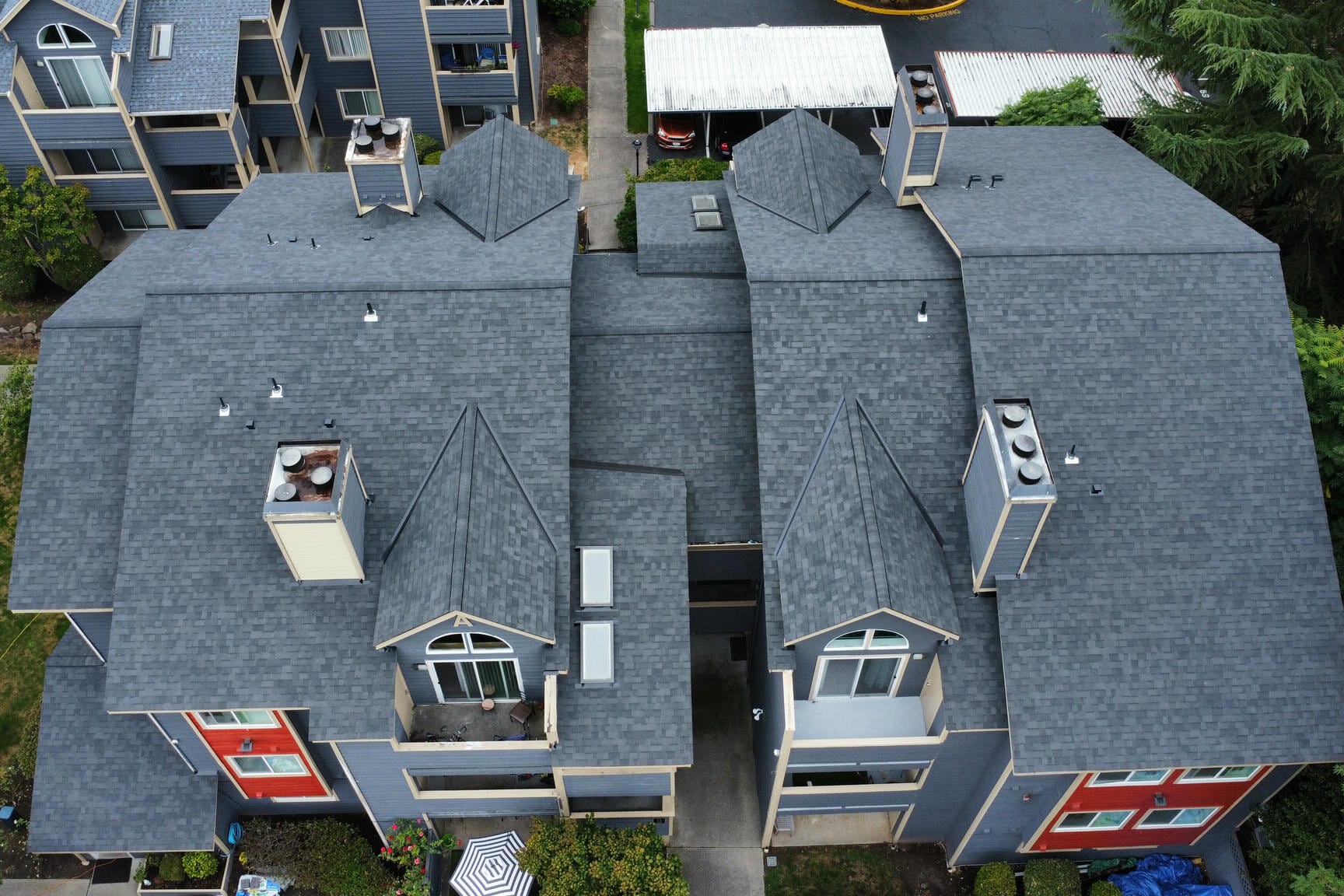
How K Single Corp Can Help
There’s no denying that while Seattle is a nice place to call home. However, its climate can be detrimental to your roof and property. That’s where K Single Corp comes in. Our Seattle roofing company is here to help you understand common roofing issues homeowners in the area face so you can be proactive and prevent them as much as possible.
We are proud to offer a full suite of services tailored to your needs, including:
- Expert Roof Repairs: Whether it’s a small leak or significant damage, we’ll restore your roof’s integrity.
- Professional Roof Installation: Ready to upgrade or replace your roof? We’ll ensure a durable, high-quality installation that lasts for years.
- Additional Services: From gutter maintenance to siding repairs and painting, we provide additional home improvement solutions that safeguard your entire property.
In Need of an Experienced Seattle Roofer Schedule Your FREE Estimate With K Single Corp Today
If you’re looking for a reputable roofing company in Seattle, don’t hesitate to contact K Single Corp today. Once you schedule a FREE estimate, we can inform you of how to maintain your roof and resolve any problems it may have. We look forward to hearing from you!
The Ultimate Guide to Residential Roofing Materials
The Ultimate Guide to Residential Roofing Materials
By K Single Corp Roofing & General Contractor
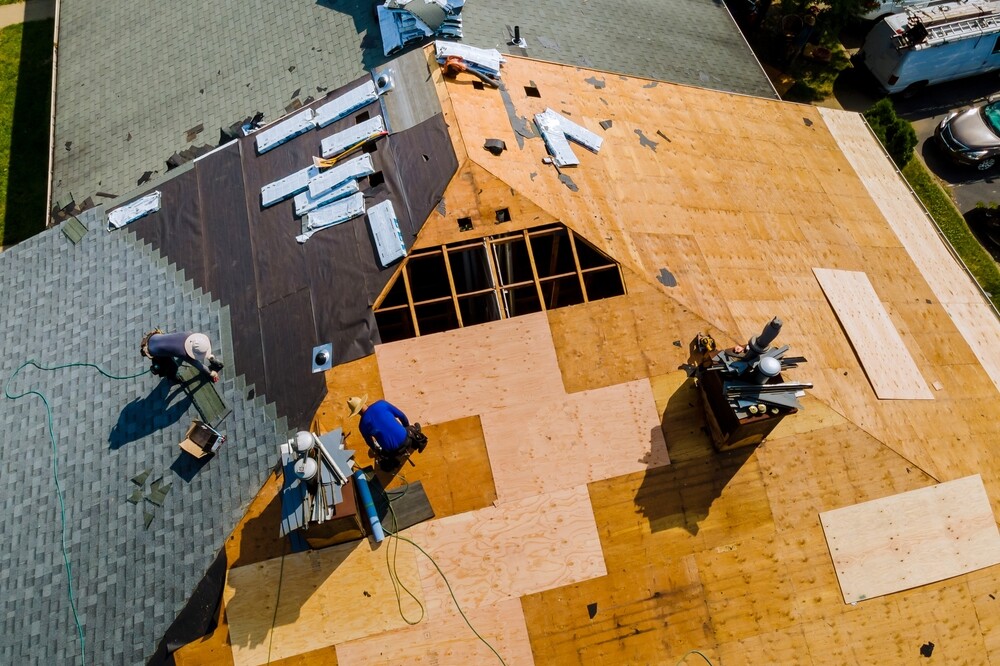
If you’re in the market for a new roof, there are plenty of options at your disposal. But how do you choose? Each has its own strengths and weaknesses as well as situations they are best fit for.
So, before you go ahead and pick a roofing material, however, it’s important to consider the various choices available as well as educate yourself on the pros and cons of each. The ideal material depends on a number of factors, including your budget, durability requirements, aesthetic preferences, and much more.
Below, we’ll dive deep into four popular roofing styles so you can make an informed decision for your unique situation.
Roofing Materials: At a Glance
Here’s an overview of four popular roofing options you may want to explore:
| Cost (per square foot) | Maintenance Required | Durability | Longevity | Appearance | |
|---|---|---|---|---|---|
| Cedar Shake | $4 to $7.25 | High maintenance | Durable | Up to 30 years | Rustic and natural look; offers a warm, traditional aesthetic. |
| Flat | $2.50 to $9 | Some types require more maintenance than others | Durable | Up to 30 years | Minimalist and modern. |
| Metal | $4 to $40 | Low maintenance | Very durable | Up to 50 years | Sleek and versatile. |
| Asphalt Shingle | $1.50 to $9.50 | High maintenance | Somewhat durable | Up to 30 years | Available in a wide variety of colors and textures to match many home styles. |
Cedar Shake
A cedar shake roof is composed of natural cedar, which comes from Cedar trees. If you’re looking for a beautiful, natural, and environmentally friendly roof that offers excellent insulation, this option should be on your radar. As long as you care for it properly, a cedar shake roof can last for up to 30 years. The downside of a cedar shake roof is the maintenance it requires. Since it’s susceptible to moss and algae buildup as well as moisture damage, you’ll need to inspect and clean it on a regular basis.
Flat
Contrary to their name, flat roof systems aren’t completely flat. Instead, they feature a small pitch that allows water to drain. These types of roofs are typically seen in places with low rainfall. If you opt for a flat-style roof, you can choose from the following:
- TPO: Thermoplastic Polyolefin (TPO) roofing is a popular flat roofing option recognized for its durability and sustainability. Made from a blend of rubber and plastic, TPO is highly resistant to tears, punctures, and UV damage. Its reflective surface helps lower cooling costs by deflecting heat and sunlight, while its recyclability at the end of its lifespan reduces environmental impact.
- PVC: PVC roofing is a durable single-ply membrane crafted from synthetic plastic polymer reinforced with fiberglass or polyester for added strength. Known for its resilience, PVC can withstand UV radiation, chemical exposure, fuels, and high temperatures without deteriorating. Its reflective surface minimizes heat absorption and helps reduce cooling costs by effectively deflecting sunlight and UV rays.
- Torch down: Torch down roofing, or modified bitumen roofing, is a sturdy and dependable choice for flat roofs. It features sheets of modified bitumen that are heat-welded with a torch to create a seamless, waterproof barrier. This roofing system is valued for its exceptional durability, flexibility, resistance to weathering and UV rays, and, most notably, its cost-effectiveness.
Metal
In recent years, metal roofs have become very popular due to their impressive durability, energy efficiency, and long lifespans. Whether you opt for aluminum, steel, or copper, a metal roof has the potential to last 50 years or more with proper maintenance. If energy efficiency is your top priority, a metal roof is worth exploring. The main downside of metal roofs, however, is their higher upfront costs. They’re also noisier than other types of roofs, especially during hail or rain storms.
Asphalt Shingle
When most people think of roofs, asphalt shingle roofs are usually the first option that comes to mind. Due to their easy installation and affordable price point, asphalt shingles are considered the most common roofing style. If you go this route, you can opt for three-tab shingles, which are separated into three sections and offer a minimalistic look.
Another option is architectural shingles, which are designed to replicate other types of roofs and provide greater dimension. Both types of asphalt shingles are long-lasting and can remain in good shape for up to 30 years. In addition, they come in countless colors and styles, so you’re bound to find an asphalt shingle that aligns with your home’s aesthetics and personal preferences.
How to Choose the Right Roofing Material
As you explore various roofing options, here are several factors to keep in mind:
- Your Budget: Think about what you want to spend on a roof. If you’re cost-conscious, asphalt shingles are likely your best bet. However, if you want to splurge on a long-lasting roof, you may benefit from a metal roof. But also keep in mind that investing in a more durable roofing system will likely save you money in the long run as it will last longer, and you won’t have to pay for as many repairs.
- Your Maintenance Preferences: Some roofs require more maintenance than others. If you don’t want to worry about regular maintenance, you should go with an extremely low-maintenance option like metal. Other options like asphalt shingles and cedar shake require consistent inspections and maintenance to ensure they remain in good condition.
- Your Aesthetic Preferences: Different roofing materials offer various visual styles, as mentioned in our table above. Some are modern, some are timeless/classic, and some are extremely versatile and can be used for different vibes. So, you’ll need to consider what aesthetic fits your personal style as well as your home’s architectural integrity.
- Your Durability Needs: If durability is a top priority, consider materials that have a stronger resistance to weather, UV rays, and wear, such as metal or slate. Asphalt shingles are not as long-lasting under harsh conditions compared to those materials.
- Your Location: Climate plays a significant role in choosing the right roofing material. In regions with heavy snowfall or frequent rainfall, a durable option like metal may be the best choice due to its water-shedding properties. If you are in a warmer climate, a more lightweight, reflective option might be a better fit.
Contact K Single Corp for All Your Roofing Installation Needs
K Single Corp is pleased to professionally install cedar shake, flat, metal, and asphalt roofs in Seattle and the surrounding areas. If you’re unsure of the right roof for your particular home and situation, our roofing experts can provide a solid recommendation. With over 25 years of experience and more than 15,000 successful roofing jobs under our belt, we’re an invaluable resource. Schedule your FREE estimate today!
Pros and Cons of Choosing a Metal Roof for Your Home
Pros and Cons of Choosing a Metal Roof for Your Home
By K Single Corp Roofing & General Contractor
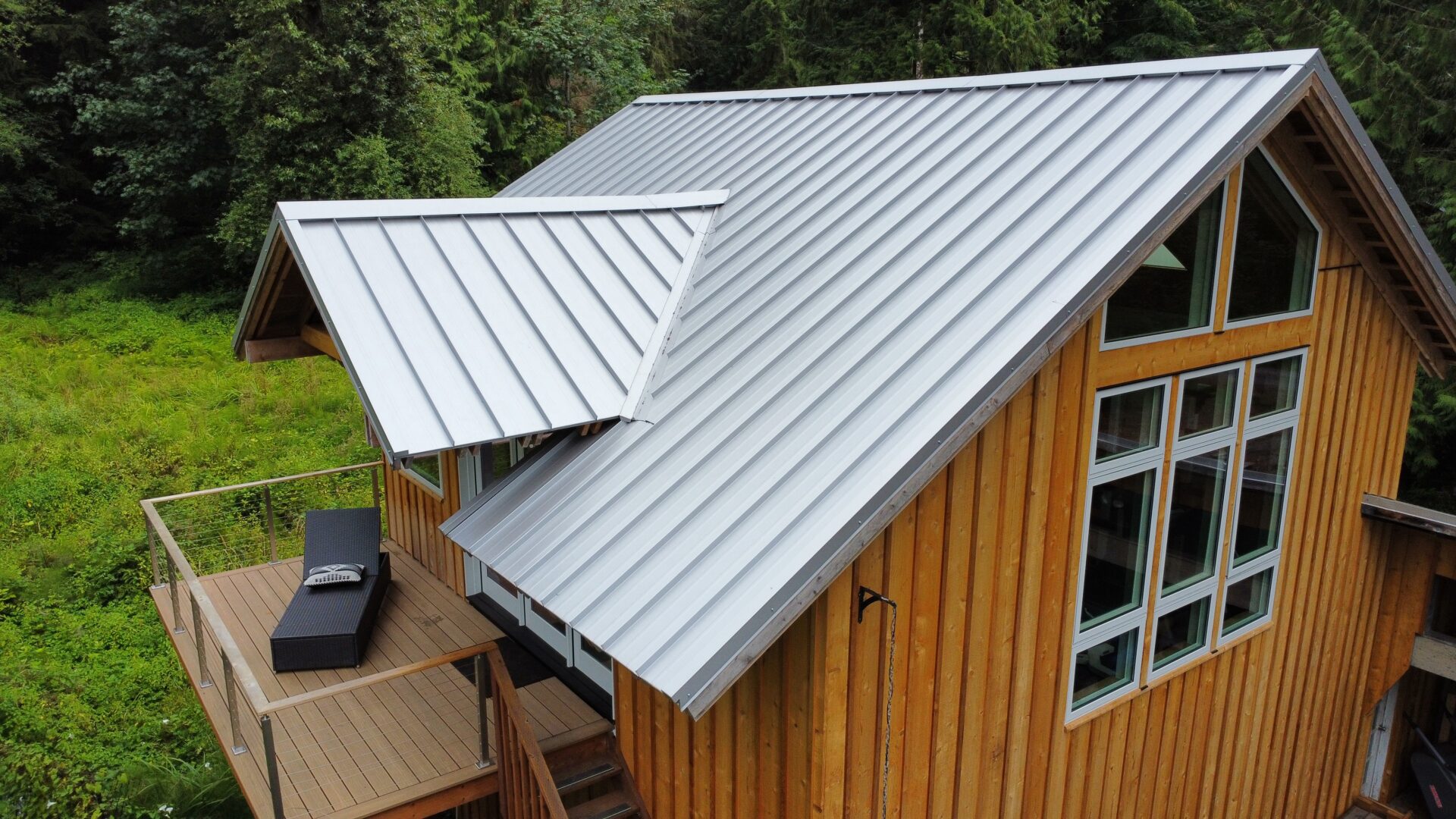
If it’s time to replace the roof on your home or commercial building, you may want to consider a metal roof. Since your roof is an important investment, be sure to consider the benefits and drawbacks of this option before taking the plunge. Your budget, lifestyle, preferences, and location will all determine whether metal roofing is worthwhile. To help you decide, we’ve compiled this handy list of pros and cons.
Benefits of Metal Roofing
In recent years, metal roofs have become more popular than ever before. Here are several reasons this roofing option is so appealing to homeowners and property owners in the Seattle area:
Durability
Regardless of where you live, durability should be top of mind. If you’re in Seattle, a strong roof that can withstand harsh weather events, like winds, storms, hail, and even fire. Fortunately, metal roofs are known for their impressive durability. Believe it or not, a metal roof can last 50 years or more as long as it’s maintained properly. Compared to traditional asphalt shingles, with a typical lifespan of up to 20 years, metal roofs are far more durable.
Rust and Corrosion-resistant
Most modern metal roofs are treated with special coatings to prevent rust and corrosion. This makes them an attractive choice for homeowners or property owners looking for a low-maintenance option that is going to keep its aesthetic appeal year after year.
Low Maintenance
Compared to other types of roofing, metal roofs require minimal upkeep. They are less prone to issues like cracking, warping, loose shingles, or moss growth due to their design and exceptional durability. Occasional inspections to check for dents, scratches, or loose fittings are about all the maintenance they need.
Fire Resistance
Metal roofs are non-combustible, making them an excellent choice for fire-prone areas. Paired with proper underlayment materials, a metal roof can offer additional protection and give homeowners peace of mind that they are protected in the event of a fire.
Energy Efficient
Since metal roofs reflect heat rather than absorb it, they offer exceptional energy efficiency, reducing your costs by up to 25%. During the hot Seattle summers, a metal roof can keep your family and guests comfortable without requiring you to turn up the air conditioning. You may even choose a metal roof with reflective pigments, which may further enhance the efficiency of your home. In the winter, the metal can help insulate your home and in turn, reduce your heating needs.
Versatile
Metal roofs are not created equal. If you shop around, you’ll find countless options with different styles, materials, coatings, and colors. You can also find a metal roof that’s been built to replicate other types of roofs, such as cedar shake, slate, and asphalt roofs. It should be fairly easy to find a metal roofing system that matches your home’s unique architectural style and your particular preferences. You can choose a metal roof that blends in or stands out among other homes in your neighborhood.
Safety
Contrary to popular belief, metal roofs are safe. Even though they’re made of metal, you don’t have to worry about lighting strikes against them. If there’s lightning outside, there’s a low chance it will hit your roof. This is because lightning will usually make its way to the ground area of your home instead of your roof.
Environmentally Friendly
If you’re a homeowner or property owner who prioritizes sustainability, metal roofs are a great choice. Many are made with recycled materials and are themselves recyclable at the end of their life. Additionally, their energy-saving properties reduce overall carbon footprints.
Drawbacks of Metal Roofing
While metal roofing systems offer many advantages, they’re not perfect. Some of the most noteworthy drawbacks of metal roofs include:
Cost
Metal roofs are not a viable option if you’re budget-conscious. Even though they’re incredibly energy efficient and can last for 50 years or longer, they’re significantly more expensive than other roofing materials, such as asphalt shingles, for example. While pricing varies by manufacturer and the specifics of a metal roof, you can expect to pay up to ten times more for a metal roof than asphalt shingles. It’s up to you to do the math and determine if the benefits of a metal roof are worth the higher upfront cost.
Dent Risk
There’s no denying that metal roofs are durable. However, they’re also prone to denting. While they do have the ability to withstand a variety of harsh weather conditions, the risk of dents from high-impact events is still there. A tree branch during a hailstorm may dent your metal roof, so it’s important to be aware of this risk.
Noise
During hail or rainstorms, a metal roof may be loud. The good news is advanced installation techniques and a quality product with solid insulation capabilities can mitigate the noise. Despite the fact that metal roofs can cause more noise than other roofing materials, many homeowners still believe they’re a good idea.
Specialized Installation
Installing a metal roof requires specific expertise. Hiring experienced professionals is essential for ensuring a proper fit and long-term performance. This can add to the overall cost and complexity of your roofing project.
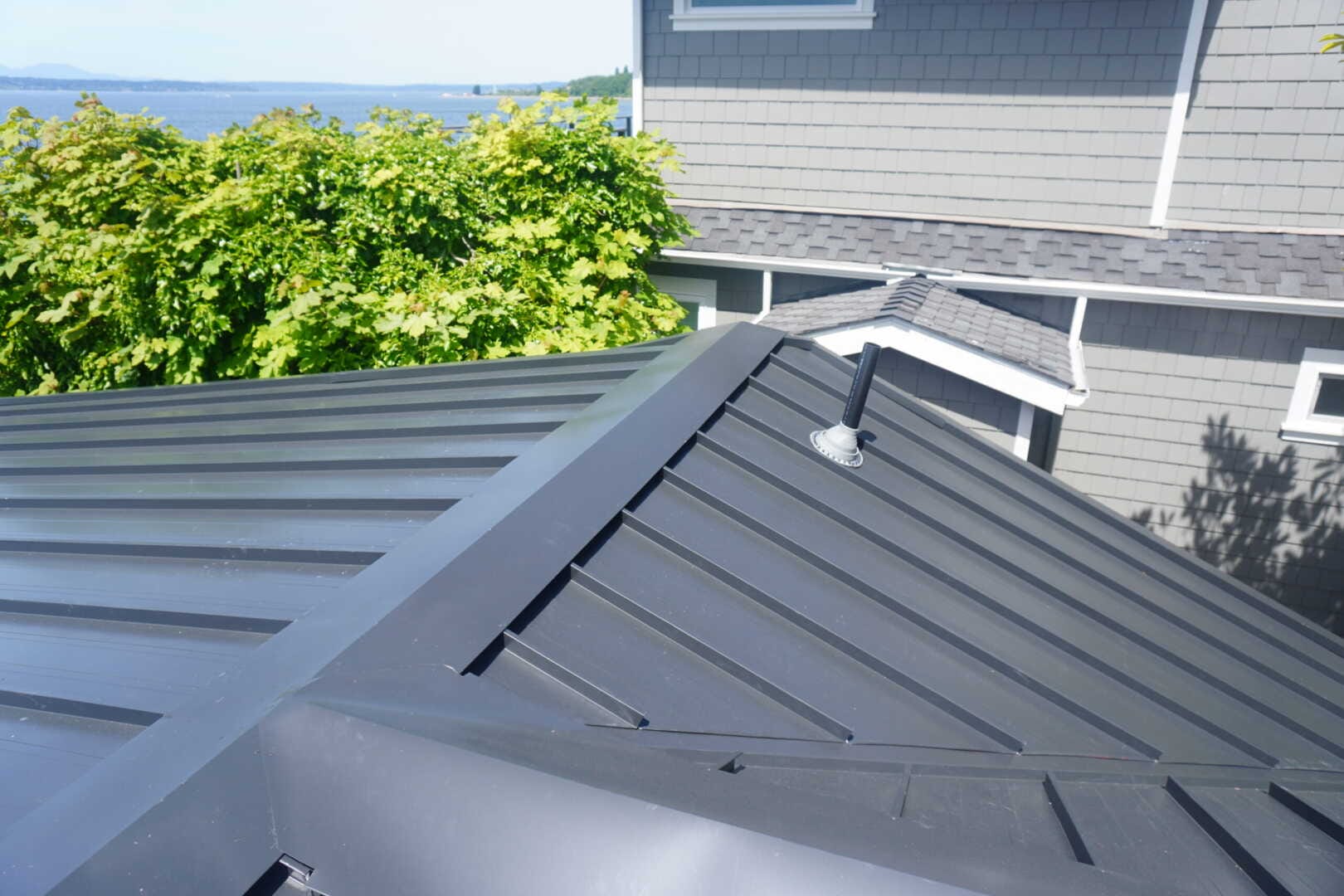
Should I Invest in a Metal Roof?
Whether a metal roof is worthwhile depends on your priorities. If you’re in the market for a durable, eco-friendly roof that stands the test of time, a metal roof can be a smart move. This is particularly true if you don’t mind the higher price tag. However, if you’re on a budget and prefer a more traditional style roof, you might be better off with an asphalt or cedar shake roofing system.
Types of Metal Roofs
If you decide to jump on the metal roof bandwagon, here are the options you can choose from:
- Steel: Steel is a popular choice due to its strength, durability, and lower cost.
- Aluminum: Aluminum roofs are lightweight and resistant to rust, making them a great pick if you live somewhere that’s prone to salt corrosion.
- Copper: With a copper roof, which is usually pricier than other roof options, you can give your home a distinct look.
- Zinc: Zinc roofs are ideal if you’d like a roofing system that can naturally self-heal minor scratches over time.
Interested in a Metal Roof? Schedule a Free Estimate with K Single Corp Today
If you think you’d benefit from a metal roof, K Single Corp can help. We’ve installed many metal roofs in the Greater Seattle Area and pride ourselves on top-notch products from reputable manufacturers. If you’re unsure of whether a metal roof is a good option, we’ll be more than happy to make a recommendation based on your specific situation. Call us today to schedule your FREE estimate and get the process started.

